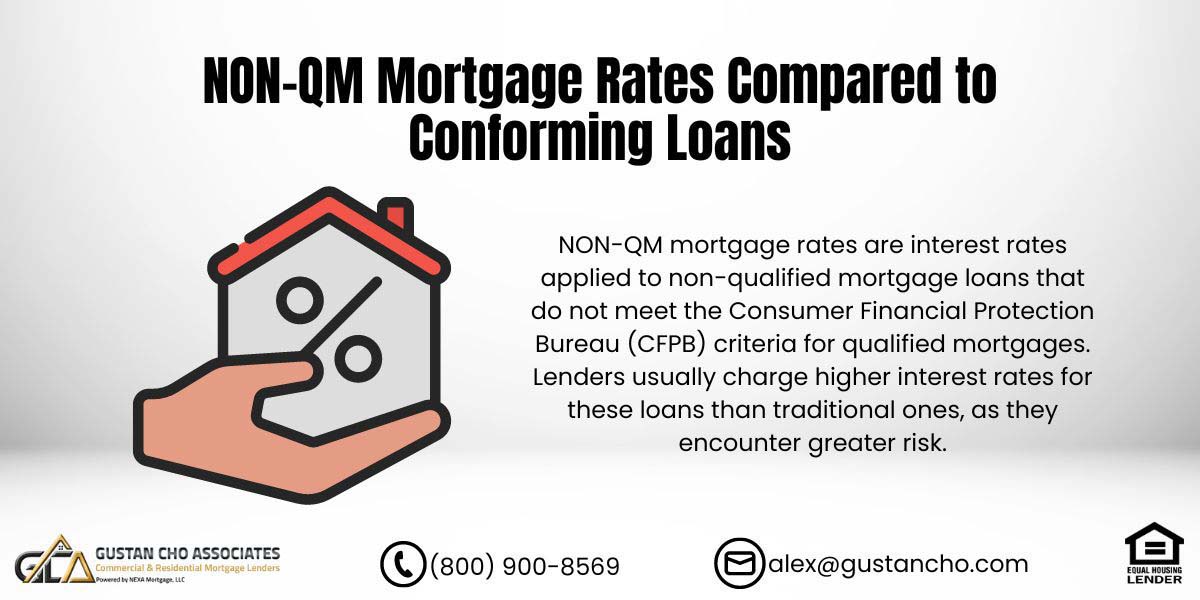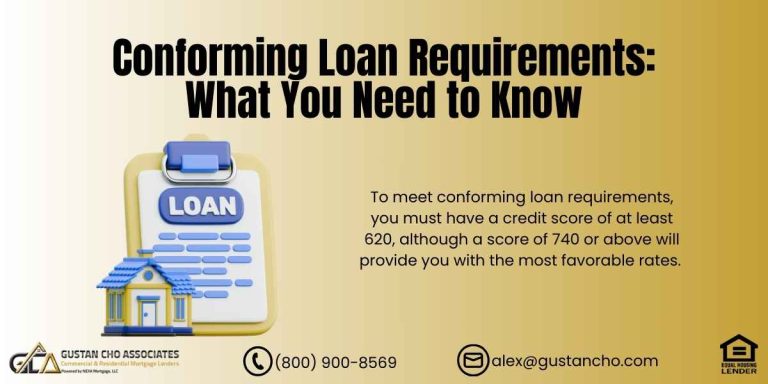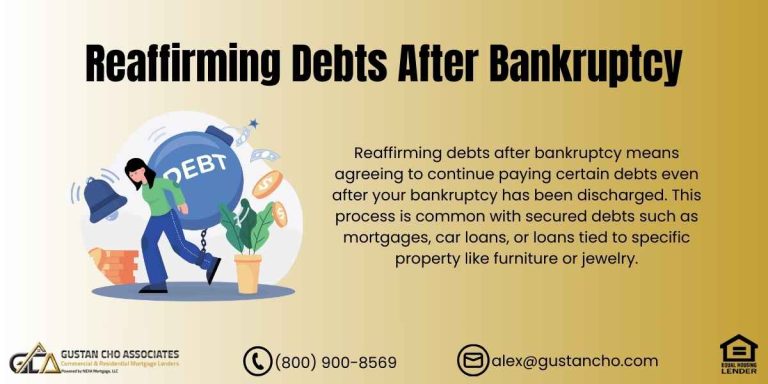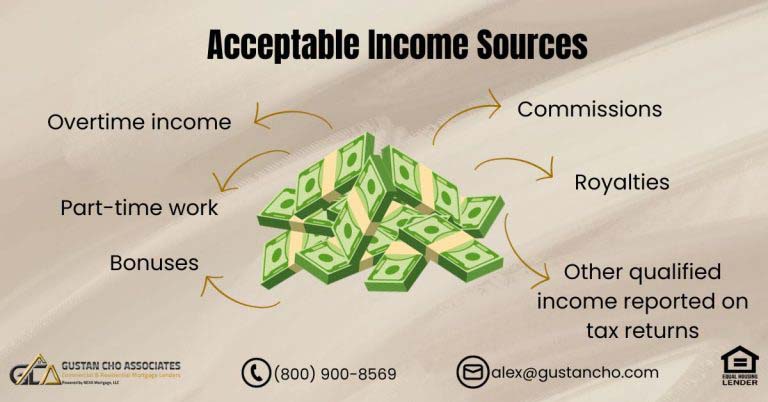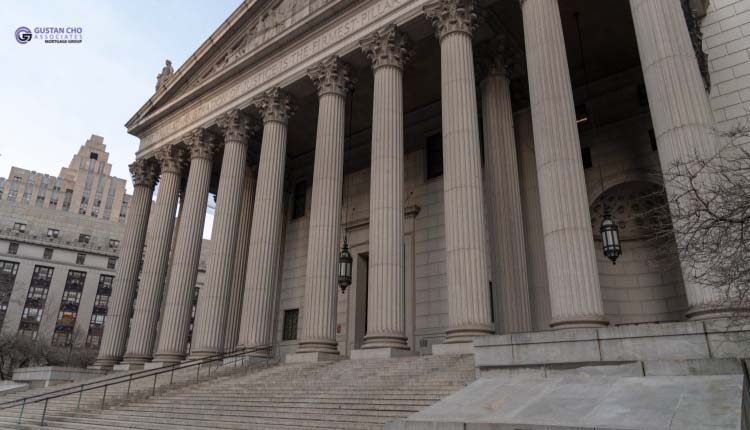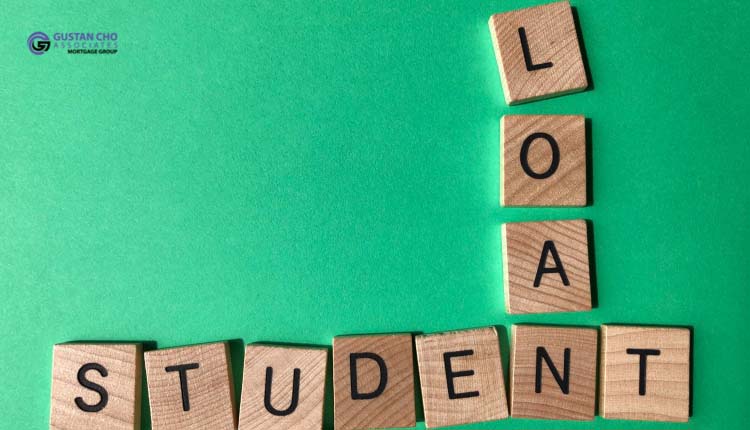There is no doubt that non-QM mortgage rates are higher than rates on traditional loans. Mortgage rates have been at historic lows the past year. The trend seems like mortgage rates will continue to rise in the coming months into 2022. With mortgage rates rising, normally there is a slowdown in home purchases. However, housing demand remains strong throughout the United States and there are no signs of a slowdown in the imminent future.
Many people assume non-QM mortgage rates are high. Non-QM mortgage rates are not bad. All rates, including non-QM mortgage rates, are based on the layered risks posed to the lender. The more the risk to the lender, the higher the pricing hits which means the higher the non-QM mortgage rates.
Is Non-QM the Same as Non-Conforming?
Non-QM (non-qualified mortgage) loans and non-conforming loans are not the same, though they can overlap. Non-QM loans offer flexibility for borrowers with unique financial situations, such as irregular income or self-employment. While they don’t meet CFPB’s qualified mortgage criteria, they provide opportunities for those with complex financial needs. These loans offer more flexible underwriting standards but typically have higher NON-QM Mortgage Rates.
Non-conforming loans do not meet the requirements set by government-sponsored enterprises (GSEs) like Fannie Mae and Freddie Mac. The popular non-conforming loan variety is known as a jumbo loan, surpassing the loan limits set by the GSEs.
The primary difference lies in their regulatory framework and borrower profiles. Non-QM loans are defined by the CFPB’s qualified mortgage standards. In contrast, non-conforming loans are defined by GSEs’ loan limits and guidelines. While non-conforming loans often include jumbo loans for larger properties, NON-QM Mortgage Rates apply to loans focusing more on unique borrower qualifications rather than loan size. This distinction is crucial for borrowers to understand, especially when seeking a mortgage that best fits their financial situation.
Wondering How NON-QM Mortgage Rates Compare to Conforming Loans? Let’s Break It Down for You!
Contact us today to explore the differences and find the best mortgage option for your needs.
Non-QM Loans After Bankruptcy and Foreclosure
Many home buyers who are ready to purchase homes now cannot qualify with government and/or conventional loans due to not meeting the mandatory waiting period after foreclosure or bankruptcy. With the launch of the new NON-QM Loans, there is no waiting period after a housing event and/or bankruptcy. NON-QM Mortgage Rates are normally higher than government and conventional loans. However, with traditional mortgage rates rising, non-QM mortgage rates do not seem as high as it once was.
Both government and conforming mortgage rates have been rising for the past 18 months with no signs of correction. Mortgage rates are in the high 2.0% and into the 3.0%. Some mortgage borrowers with lower credit scores and loan pricing adjustments due to higher debt to income ratios are now paying points. Until recently, most homebuyers who did not meet the waiting period requirements after foreclosure, deed in lieu of foreclosure, and short sale were blocked out of the housing market.
Homebuyers Recovered From Recent Bankruptcy and/or Housing Event No Longer Have To Meet Waiting Requirements To Purchase A Home
There is more demand for homes than there is inventory. This creates a rise in home prices. Now home buyers with a 10% to 30% down payment are eligible to purchase homes with non-QM loans rather than waiting out the waiting period requirements on government and conventional loans. NON-QM Loans have no private mortgage insurance requirements. Lower credit scores or self-employed borrowers can benefit from non-QM loans more than they can from traditional mortgage loans.
How Mortgage Lenders Price 30 Year Fixed Traditional Loans Versus Non-QM Mortgage Rates
If you are a prime borrower with at least a credit score, 20% or more in equity, or 20% or the more down payment on a home purchase, and conforming debt to income ratios, you can most likely lock your mortgage rate at a good interest rate. Those with lower credit scores, higher loan to value, and higher debt to income ratios, will most likely get rate adjustment and pay higher mortgage rates.
For prime credit 15-year fixed mortgage borrowers, the current mortgage rates are even lower. These mortgage rates are national averages and vary from state to state. FHA and VA loans are not as credit score sensitive as conventional loans. This is because these loans are backed by the Federal Housing Administration and the Department of Veterans Affairs respectively. However, if borrowers’ credit scores are lower than 640, then government loans will have Loan Level Pricing Adjustments (LLPA).
NON-QM Mortgage Rates And Down Payment Requirements
10% to 30% down payment is required on NON-QM loans.
- 10% down payment on home purchase on 680 credit scores.
- 15% down payment on 660 credit score.
- 20% down payment on under 660 credit scores.
- Non-QM mortgages one day out of bankruptcy and/or foreclosure require a 30% down payment.
- No private mortgage insurance on non-QM loans.
- No loan limit caps on non-QM mortgages.
Factors That Affect The Pricing Of Mortgage Rates On Non-QM Loans
NON-QM Mortgage Rates are based on the following:
- credit scores
- down payment
- seasoning from housing event
- type of property
Refinancing NON-QM Loans To FHA Or Conventional Loans
Homeowners with non-QM loans can think about refinancing current NON-QM Mortgage Rates to FHA or Conventional loans to see if they can get a lower interest rate. Borrowers can also think of refinancing their FHA to Conventional Loans to eliminate the high cost of FHA’s annual mortgage insurance premium. FHA’s annual mortgage insurance premium is 0.85% of the mortgage balance. For a homeowner with an FHA Loan, the borrower will be paying an FHA mortgage insurance premium, no matter how low the loan to value is.
Conventional Rates With Private Mortgage Insurance versus no PMI on Non-QM Loans
There is private mortgage insurance required for conventional loans with higher than 80% loan to value. However, private mortgage insurance can be canceled if the property has at least an 80% Loan To Value. There is also Lender Paid Mortgage Insurance, also known as LPMI. The homeowner does not pay mortgage insurance even if their loan to value is higher than 80% in lieu of a slightly higher mortgage rate.
NON-QM vs. Conforming Loan Rates – Which One Is Right for You? We Can Help!
Contact us today to explore your mortgage options and find the best rate for your situation.
Non-QM Mortgage Rates and Options For Owner-Occupant Homes: Second Homes, Investment Properties
Non-QM and alternative financing loan programs are becoming to be the most popular mortgage program in the nation. Like conventional loans, non-QM loans are for both owner-occupant primary homebuyers and real estate investors. There are dozens of non-QM loan programs for real estate investors. Non-QM loans are not just for bad credit mortgage borrowers. Many self-employed high credit profile borrowers benefit from non-QM loans. In this article, we will discuss and cover non-QM loans one day out of bankruptcy and foreclosure.
Do Non-QM Loans Have Higher Interest Rates?
Yes, non-QM (non-qualified mortgage) loans typically have higher interest rates than traditional QM (qualified mortgage) loans. This is because non-QM loans cater to borrowers who may need to meet the standard criteria for conventional loans, such as those with irregular income, self-employed individuals, or those with past credit issues. Because of the higher risk involved with these loans, lenders impose higher interest rates to compensate for the potential risk.
In 2024, the interest rates for non-QM loans continue to reflect this risk premium, making them generally higher than those for QM loans. However, non-QM loans offer greater flexibility in eligibility and underwriting criteria, benefiting borrowers who need alternative financing options.
Bad Credit Versus Timely Payment In The Past 12 Months
Mortgage borrowers can qualify for home loans with prior bad credit but need to have been timely on all of their payments in the past 12 months. Borrowers can qualify for home loans after bankruptcy, foreclosure, short sale, and deed in lieu of foreclosure. However, government and conventional loans require a mandatory waiting period after the credit event.
The good news we have is that Gustan Cho Associates now offers non-QM loans with recent credit events. This holds true for both purchase and refinance transactions. We will cover NON-QM Loans With Recent Credit Events and what type of borrowers can benefit from this loan program.
What Are Examples Of Recent Credit Events?
Recent credit events are the following:
- Foreclosure, deed in lieu of foreclosure, short-sale that has not been seasoned three years
- Recent late payments in the past 12 months on credit tradelines
- Bankruptcy in the past two years
- Recent collections/charge-offs
- Other extenuating circumstances lead to late payments and not paying bills on time
The above extenuating circumstances happen to the best of us. Divorces can be brutal. The majority of folks who go through a recent divorce often have their credit bruised. Death in the family is another extenuating circumstance that affects household income and credit. Job loss, business loss, and company takeovers are other reasons. Regardless of the reason, the good news we have is that we now offer NON-QM Loans With Recent Credit Events.
Until now, borrowers with recent late payments could not have qualified for a mortgage. With our new NON-QM Loans With Recent Credit Event, borrowers can qualify for a home loan now rather than later. Once they have their credit re-established, we can then refinance them into a traditional government and/or conforming loan.
Types Of Borrowers Who Can Greatly Benefit From NON-QM Loans With Recent Credit Event
Home prices are rising in all areas of the United States. The Federal Housing Finance Agency (FHFA) increased conforming limits to $548,250 on conventional loans. FHFA increased conventional loan limits for three years in a row due to rising housing prices. HUD, the parent of FHA, followed the FHFA lead and raised FHA Loans Limits to $356,362 for 2021. Again, HUD increased FHA Loan Limits for three years in a row due to rising home prices. Mortgage rates keep on rising to the great economy. With rates still rising, the housing demand remains high.
Non-QM Mortgage Rates Not Too Much Higher Than Conforming Rates
There does not seem a housing correction is going to happen in the near future. All statistics and economic data suggest that housing prices will continue to climb. Many homebuyers who recently had a housing event or recent credit event cannot take advantage of the housing boom with traditional government and conventional loans. Now with NON-QM Loans, these types of home buyers can qualify for a mortgage and do not have to wait many years when they are priced totally out of the market.
NON-QM Loans With Recent Credit Events Such As Recent Divorce
On the refinance side, many homeowners enjoyed their homes appreciate in recent years due to the housing boom. However, most divorces can affect people’s credit. There are instances where one spouse will get the home but only has a certain amount of time to get their names out of the mortgage note. With non-QM loans, homeowners with recent bad credit can qualify for a cash-out refinance.
Non-QM Credit Requirements
The amount of cash-out is dependent on the equity homeowners have in their homes. On the flip side, homeowners with recent credit events due to a divorce may want to purchase a new home rather than rent. Cases like these often happen where people need to purchase versus rent due to having children or many pets. Again, home buyers with recent credit events can now qualify for non-QM loans rather than waiting years to qualify for government-backed and/or conventional loans.
NON-QM Loan Rates vs. Conforming Loans – We’ll Help You Make the Right Choice!
Contact us today to learn more about the options available and which mortgage suits your needs best.
NON-QM Loans With Recent Credit Event Mortgage Guidelines
Non-QM Loans are becoming increasingly popular.
Basic eligibility requirements are as follows:
- No waiting period after the housing event
- No waiting period after bankruptcy for qualified individuals
- 10% to 20% down payment is required
- The amount of down payment depends on borrowers’ credit scores and the longevity of the credit event
- Mortgage rates depend on borrowers’ credit scores, down payment, and longevity of credit event
- There is no loan limit
- There is no private mortgage insurance required
- Bank statement loans for self-employed borrowers are available
FAQs: NON-QM Mortgage Rates Compared to Conforming Loans
-
1. What are NON-QM mortgage rates? NON-QM mortgage rates are interest rates applied to non-qualified mortgage loans that do not meet the Consumer Financial Protection Bureau (CFPB) criteria for qualified mortgages. Lenders usually charge higher interest rates for these loans than traditional ones, as they encounter greater risk.
-
2. Why are NON-QM mortgage rates higher than traditional loan rates? NON-QM mortgage rates are higher because they cater to borrowers with unique financial situations, such as irregular income or self-employment, posing higher risks to lenders. The higher interest rates help compensate for these risks.
-
3. Are NON-QM loans the same as non-conforming loans? No, while they can overlap, NON-QM loans and non-conforming loans are not the same. NON-QM loans offer flexibility for borrowers who do not meet CFPB’s qualified mortgage standards. Loans that do not conform to standard guidelines, like jumbo loans, go beyond the loan limits established by government-sponsored enterprises (GSEs) such as Fannie Mae and Freddie Mac.
-
4. What are conforming loans? Conforming loans adhere to the standards established by GSEs, such as designated loan limits and credit criteria. Because they present a reduced risk to lenders, these loans generally have lower interest rates.
-
5. What are non-conforming loans? Non-conforming loans often need to meet GSE guidelines because they exceed loan limits or have more flexible credit criteria. Jumbo loans are a common type of non-conforming loan.
-
6. How do rising mortgage rates affect NON-QM mortgage rates? As overall mortgage rates rise, NON-QM mortgage rates also increase. However, due to the broader trend of increasing mortgage rates, NON-QM rates may seem lower than traditional loans.
-
7. Can homebuyers with recent bankruptcies or foreclosures get a NON-QM loan? NON-QM loans often do not require a waiting period after significant credit events like bankruptcy or foreclosure, making them accessible to borrowers recovering from these events.
-
8. What are the benefits of NON-QM loans for homebuyers with recent credit events? NON-QM loans allow homebuyers to purchase properties without waiting for extended periods after credit events. They also do not require private mortgage insurance and offer flexibility in underwriting standards.
-
9. How do lenders price 30-year fixed traditional loans versus NON-QM mortgage rates? Lenders price 30-year fixed traditional loans based on borrower credit scores, down payments, and debt-to-income ratios. NON-QM mortgage rates are higher due to the additional risks associated with borrowers who do not meet traditional criteria.
-
10. What are the down payment requirements for NON-QM loans? Down payment requirements for NON-QM loans typically range from 10% to 30%, depending on the borrower’s credit score and the specific loan terms.
-
11. Can homeowners with NON-QM loans refinance to lower rates? Yes, homeowners with NON-QM loans can consider refinancing to FHA or conventional loans if they qualify for lower rates, potentially reducing their monthly payments.
-
12. Are NON-QM loans available for investment properties? NON-QM loans are available for owner-occupied homes and investment properties, offering various options for real estate investors.
-
13. What factors affect NON-QM mortgage rates? Factors affecting NON-QM mortgage rates include credit scores, down payments, the seasoning period from housing events, and the financed property type.
-
14. How can homebuyers with recent credit events benefit from NON-QM loans? Homebuyers with recent credit events, such as bankruptcies or foreclosures, can benefit from NON-QM loans by securing financing without waiting for extended periods, thus taking advantage of current housing market opportunities.
-
15. What makes NON-QM loans attractive in a rising interest rate environment? NON-QM loans remain attractive in a rising interest rate environment due to their flexibility and the ability to help borrowers with unique financial situations access home financing when traditional loans are not an option.
For more information on our non-QM loans with recent credit events, please contact us at Gustan Cho Associates at 800-900-8569 or text us for a faster response. Or email us at gcho@gustancho.com. Special thanks to our SVP Dale Elenteny and NON-QM Investor Jack Kotowski for their video/blog presentation to educate our loan officers and our viewers.
This blog about NON-QM Mortgage Rates Compared to Conforming Loans was updated on June 20th, 2024.
Wondering How NON-QM Loan Rates Stack Up Against Conforming Loans? Let’s Find the Best Deal for You!
Reach out today to discuss your options and get pre-approved for the right loan.


